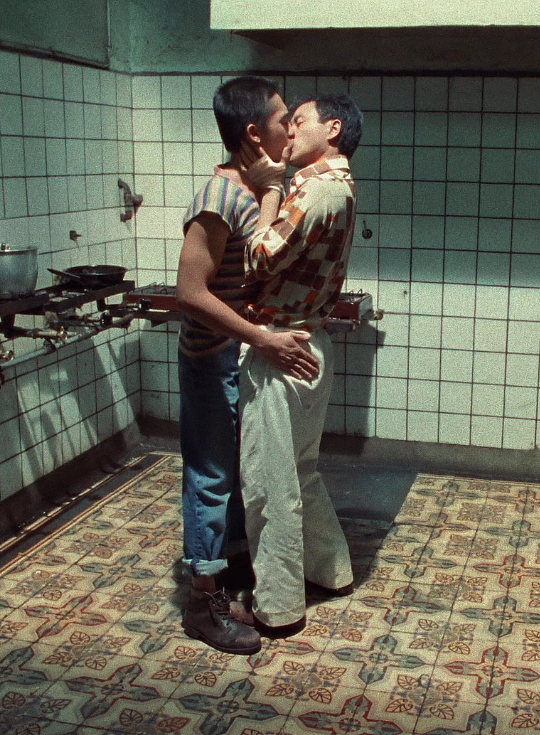This week I decided to move away from the anglo-centric films of the past two weeks and focus on international queer cinema instead. Meaning there were a lot of subtitles to read this week. But I didn’t care. The films were all incredible. Subtitles and all.
I started the week by finally watching Wong Kar-wai’s classic film Happy Together. This film has been on my to-watch list for ages, as it is consistently ranked as one of the all time classic queer films. And now I know why. Happy Together is a beautifully shot film about a tempestuous relationship between Lai Yiu-fai and Ho Po-wing, two men from Hong Kong who find themselves in a cycle of breaking up and getting back together while abroad in Argentina. The pacing is sometimes a bit spastic, but the cinematography and direction are both incredible. And Tony Leung Chiu-wai and Leslie Cheung give two powerhouse performances. This film is beautiful, lyrical, and heartbreaking, and it absolutely deserves to be considered a classic.
I then found myself in Cuba for the wonderful film Viva. Viva tells the story of Jesus, an aspiring drag performer in Havana whose estranged father suddenly crashes back into his life. And his father is not too thrilled with the life path his son has chosen. At its core, Viva is a film about family. Both the family you are born with and the family you create. And it is a wonderful example of how queer communities will often step up when your birth family fails you. I can’t say that I understood all of the choices that Jesus makes in this film. Some of them were hard to watch. But I will say that watching him and his father come to an understanding of each other was absolutely beautiful.
I then shifted my focus to Africa and began researching African LGBTQ films. There was one film that continually appeared in my search results; the Kenyan film Rafiki that was released in 2018 about two women with opposing politicians as fathers who fall in love. I saw Rafiki back in 2018 and absolutely loved it, and I’m thrilled to see that it has gone on to earn such international acclaim. But since I can’t re-watch films for this challenge, I had to go searching for something new. And that’s when I ran into some problems.
At first I wanted to watch Ìfé, a Nigerian film about a three-day date between two women. But I couldn’t find it online anywhere. I then searched for Country Love, another Nigerian film about queer femme men. But in this case, I couldn’t even find a trailer. I finally watched Reluctantly Queer by Akosua Adoma Owusu, in which a Ghanian man explores the many intersections of his identity through letters home to his mother. It was fantastic, but I’m still holding out hope that I can find the other two films at some point.
The final film that I watched this week was And Then We Danced from Georgia, and it was incredible. In particular, lead actor Levan Gelbakhiani was extraordinary. He plays Merab, a young dancer who has been training his whole life to join the National Georgian Ensemble. His life is suddenly upended, however, with the arrival of a new dancer with whom he promptly falls in love. Merab is kind, passionate, and heartbreakingly earnest. He’s exactly the kind of young queer that society often crushes, and I was heartsick for most of the film wondering what horrible fate the story had in store for him. So I was delighted when Merab ends the film very much on his own terms. It made my heart soar to watch. And Then We Danced is a truly fantastic film that will certainly be a queer classic soon enough.
What was interesting about this week was that these films were all very different. But there was one thing I couldn’t stop thinking about throughout all of them; how so much trauma and heartbreak could be avoided if we could all just let people love the people they want to love. Because it wasn’t just the characters in the films who faced difficulties. Happy Together’s poster image was banned in Hong Kong upon release. Ìfé’s filmmakers were threatened with 14 years jail time by the Nigerian government. And Then We Danced caused mass protests in Tbilisi and the production crew had to film the movie using guerrilla tactics due to death threats. All because filmmakers were daring to put queer people on film. I would laugh at the ridiculousness of it all if the consequences weren’t so horrifying.
But there’s hope. These films are still being made, meaning audiences are still getting the chance to empathize with these characters. And these films are finding an international audience. For me, the highlight of the week was a moment in And Then We Danced between Merab and his brother. It is one of the most profoundly beautiful scenes of love and acceptance I’ve seen in a queer film, and it was breathtaking to watch. The brother may not be the character you’re rooting for for most of the film. But if more people were like him when it comes to their queer relatives, the world would be a much better place.
Suggestions for artists I should check out? Please contact me with your ideas. I hope you enjoyed your daily helping of art!



